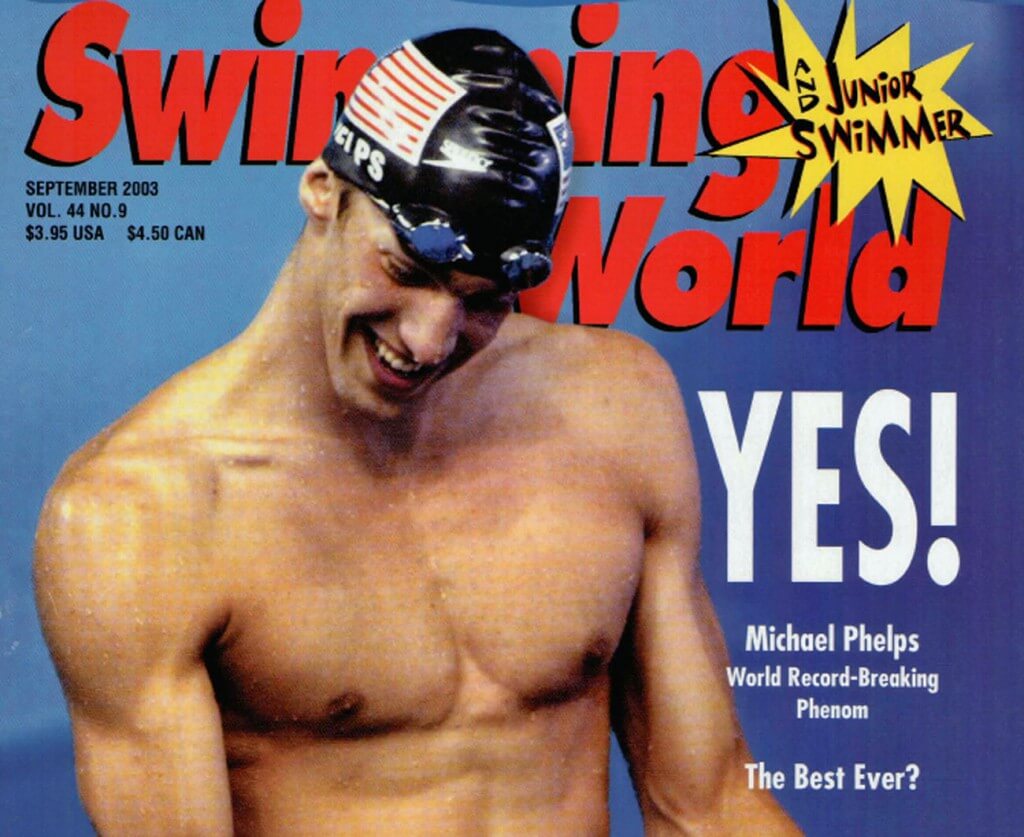Two World Records In One Day? No Problem For Michael Phelps At 2003 Worlds

Pre-coverage of the World Championships is sponsored by Wylas Timing. Each week until the start of the swimming competition at the world championships, Swimming World will look back at a previous performance at the world championships that still carries significance.
By Jeff Commings, Swimming World Senior Writer
Michael Phelps was already on the way to becoming a legend in the swimming pool by the time the 2003 world championships began in Barcelona, Spain. He had competed in the 2000 Olympic final of the 200 butterfly at 15 years old, finishing fifth. He set his first world record in 2001 as a 16-year-old, swimming a 1:54.92 in the 200 butterfly, and was rapidly improving in other events.
He had set the world record in the 400 IM in 2002, and took down Jani Sievinen’s nine-year-old world record of 1:58.16 in the 200 IM with a 1:57.94 at the Santa Clara International meet, the precursor to the current Arena Pro Swim Series. It was clear that Phelps was going to be spectacular in Barcelona.
But Don Talbot, who was then the Australian national team head coach, wasn’t getting onto the Phelps bandwagon. Just a couple of days after Phelps’ 200 IM world record in Santa Clara, Talbot publicly doubted that Phelps was in line to replace Ian Thorpe, the Australian “Thorpedo,” as the world’s best swimmer.
“We’ve got Ian Thorpe and they (USA Swimming) are trying to say they’ve got someone even better,” Talbot said. “In the major international meets, Phelps has done nothing yet. Obviously something’s going to happen at the worlds, but I think the worlds will be a bit of a crossroads for him to see just what he can do when he gets up against the world’s best.”
Phelps arrived at that crossroads and blazed right through it. He was in line for four individual gold medals at the 2003 worlds, which would have beaten Thorpe’s record of three individual golds from the 2001 championships. He only won three individual gold medals (along with a gold as a prelim swimmer in the 400 medley relay), but it was clear that he was ready for the big leagues. On July 25, he further cemented that claim by doing something that no man had ever been able to do: break two world records in two different events in one day.
It started with the semifinals of the 100 butterfly on the evening of July 25, the sixth day of the eight-day meet. Phelps was looking to make his first major international final in the 100 fly, and he looked like a lock to make it into the top eight. But what he saw in the first of two semifinals likely motivated him to go a bit faster than maybe he wanted to swim. Ukraine’s Andrii Serdinov became just the second man under 52 seconds in history with a 51.76, breaking Michael Klim’s world record of 51.81. Never one to back off a challenge, Phelps answered the call with a 51.47 in the second semifinal race.
Less than a half hour later, Phelps was back for an electrifying 200 IM final, in which he and Thorpe were to go head-to-head for the first time in their careers. This was the perfect event to determine which athlete was the best. It would showcase each athlete’s versatility across four strokes, as well as their overall endurance. Perhaps fueled by Talbot’s remarks a couple of weeks earlier, Phelps left Thorpe in his wake with a 1:56.04, breaking his world record of 1:57.52 from semifinals the day before. Thorpe was a distant second with a 1:59.66.
200 IM final, 2003 world championships
Not a bad day for someone who had never raced the 100 butterfly internationally before 2003, and who had never been under 1:57 in the 200 IM.
“That put a lot of fire in my butt,” Phelps said of Talbot’s remarks. “It got me more motivated than I already was.”
Phelps didn’t win the 100 butterfly final, losing to American teammate Ian Crocker’s world record time of 50.98 with a 51.10. But Phelps’ gold medals and world records in the 200 butterfly (1:53.93 in semifinals) and the 400 IM (4:09.09), along with his astounding 200 IM swim, started the conversation that would lead to full-blown talk of Phelps eclipsing Mark Spitz at the Olympics. It almost happened in 2004, when Phelps won a total of seven medals including five gold. And of course, Phelps set the new standard for Olympic excellence with eight gold medals at the Beijing Olympics in 2008.
As for his world championship tally, Phelps is not likely to be challenged soon. He has won 33 medals across six world championships, with Ryan Lochte’s 23 medals running in second place.
Previous world championships retrospectives:
The first 50 freestyle at the world championships
Petra Schneider sets 400 IM world record in 1982
Ryan Lochte-Michael Phelps 200 IM from 2011
Le Jingyi and the Chinese women at the 1994 world championships




